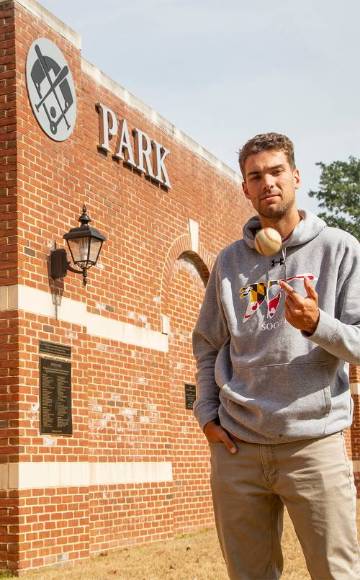
MAJORS
MINOR
EXTRACURRICULAR ACTIVITIES
- Men's Soccer
- Phi Alpha Theta Fraternity

Patrick O'Neal
Patrick O'Neal
Class of 2019 • Birmingham, AlabamaMAJORS
MINOR
EXTRACURRICULAR ACTIVITIES
- Men's Soccer
- Phi Alpha Theta Fraternity
Jackie Robinson broke the color barrier in Major League Baseball in 1947, but it would take another 18 years for a minor league team in Alabama to end racial segregation on the field. Patrick O’Neal ’19, a history major from Birmingham who came to Washington College as a Quill & Compass Scholar, was curious to understand the dynamics of that cultural shift, which occurred at the height of the Civil Rights movement. Using primary resources and conducting personal interviews with surviving members of the Birmingham Barons, Patrick wrote a chapter of American history that has yet to be told.
“Being able to write a capstone about something I’m passionate about is a great experience I don’t think I would have gotten at other schools,” says Patrick a varsity soccer player with a second major in psychology and a minor in Spanish. “A lot of people don’t know about this team, which at the time was at the heart of one of the most hostile and volatile cities of the Civil Rights era. It’s cool to me as an athlete to see how the relationships among players brought hope in this bleak period. Players, both black and white, were supportive of one another. And as they came together, so did the fans from black and white communities.”
In his senior capstone project, O’Neal examines the history of the Negro Baseball League’s powerhouse Birmingham Black Barons, and the team’s initial reluctance to lose its identity through a merger. He also discusses the impact professional sports can make in a flagging economy. But the real story is the power of sports to unite and heal a divisive city.
“We still see racial division in this country,” he says. “This serves as a reminder that people can grow an appreciation for one another and are able to unite over something. In this case, it was baseball. This team laid the groundwork that helped bring about change.”
O’Neal, who spent nine months conducting research and writing biographies to support the “Finding the Maryland 400” Project at the Maryland State Archives, is now working as a paralegal in Washington, D.C.